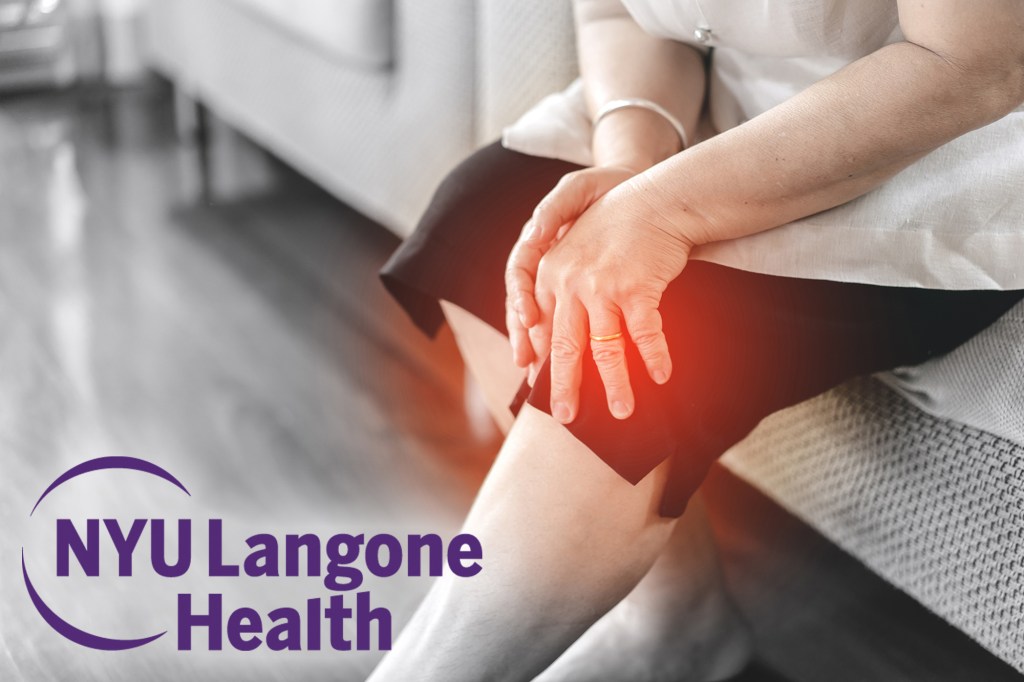- February 19, 2024
- 8 minutes read
Osteoarthritis is more common than you think: How to treat and prevent it from worsening

Osteoarthritis affects everyone on the planet, particularly as we get older. The condition is caused by wear and tear on the protective layer of cartilage on the ends of our bones — not unlike wearing down the tread on a tire. The cartilage helps our joints glide smoothly without pain, popping or stiffness.
We sat down with Dr. Vinay K. Aggarwal, a hip and knee reconstruction specialist in NYU Langone’s Department of Orthopedic Surgery, who said there are very effective ways to prevent progression with a balanced lifestyle.
I’m 50 years old and have developed osteoarthritis. What I can do to prevent it from worsening?
One of the first things patients say when they see me is that they’ve developed joint pain that affects them daily. “I know I have arthritis everywhere,” they say, and this is often an accurate description of what’s going in their body.
Osteoarthritis is a degenerative condition, and the amount you have is key to how symptomatic you may be. Osteoarthritis is most common in the hip joints, causing pain in the groin and sides of the hips, and the knee joints, leading to pain in the front, sides or the back of the knees.
Osteoarthritis is caused by wear and tear on the protective layer of cartilage on the ends of our bones — not unlike wearing down the tread on a tire. Getty Images/iStockphoto
Some of the factors that accelerate osteoarthritis and wear out our cartilage are beyond our control, like age and genetic predisposition. There are, thankfully, several factors we can control, like obesity, smoking, diet and exercise.
Studies have shown that smoking significantly hastens the drying out of articular cartilage, leading to a more brittle joint and quicker development of osteoarthritis. Watching what you eat is also important. Several studies show that every one pound of body weight can increase the pressure on knee joints, creating seven times the force on those joints. Staying active lubricates your joints — and a healthy diet and lifestyle are also important.
What can be done to treat osteoarthritis?
If preventative steps aren’t helping enough, there are still nonoperative measures that can treat the pain and stiffness that can impact your quality of life. These include medications like acetaminophen and non-steroidal anti-inflammatory medications like ibuprofen and naproxen.
While these can treat the symptoms, there are no medications yet to treat the progression of osteoarthritis, although some are being studied. Physical therapy can help with muscle strengthening and joint stretching. Injection therapy with corticosteroids or lubricants (gel) might also be recommended for some.
Dr. Vinay K. Aggarwal is a hip and knee reconstruction specialist in NYU Langone’s Department of Orthopedic Surgery.
The final option for severe osteoarthritis is surgery, which could be arthroscopic (minimally invasive) or take the form of a joint replacement, depending on the exact nature of your disease and the joint that is affected.
While it’s a last resort for many, surgery can be incredibly effective and improve your quality of life. In fact, millions of Americans undergo hip and knee joint replacement yearly with fantastic success and high satisfaction.
Before considering surgery, it’s important to choose a hospital and surgeon that you are comfortable with and have a reputation for success. The surgeon should be an expert in the body part where you need help — someone with the proper education and training who has all of the resources for a successful outcome.
This includes the full spectrum of your care: the anesthesiologist, rehabilitation services, nursing, social work and most of all, the track record of that team. In all of these areas, NYU Langone’s Orthopedic Surgery team offers the best option to help get you back to doing the things you love.
NYU Langone can help you find an orthopedic specialist close to home, and the NYU Langone Orthopedic Second Opinion Service is available via an easy-to-complete online form. A second opinion can confirm your diagnosis and treatment plan, or provide a different recommendation that you can review and discuss with your doctor.
Vinay K. Aggarwal, MD, is assistant professor in the Division of Adult Reconstructive Surgery at NYU Langone’s Department of Orthopedic Surgery. He was drawn to orthopedics because it brought together his passion for medicine with his love of athletics and helping people enjoy a better quality of life. He specializes in hip and knee conditions and leads with a conservative approach to treatment before pursuing other options.
